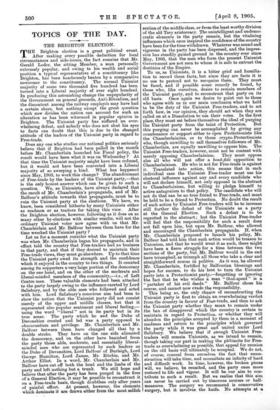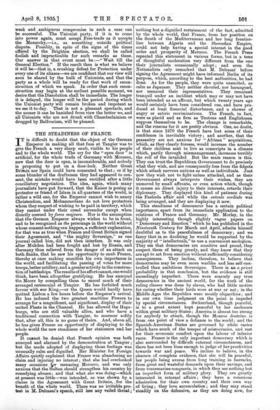TOPICS OF THE DAY.
THE BRIGHTON ELECTION.
THEBrighton election is a great political event. After making every possible deduction for local circumstances and side-issues, the fact remains that Mr. Gerald Loder, the sitting Member, a man personally extremely popular, and owing to his wealth and social position a typical representative of a constituency like Brighton, has been handsomely beaten by a comparative newcomer to the constituency. The normal Unionist majority, of some two thousand five hundred has been turned into a Liberal majority of over eight hundred. In producing this astonishing change the unpopularity of the Government on general grounds, Anti-Ritualism, and the discontent among the railway employes may have had a certain share, but nothing except the great question which now divides the nation can account for such an alteration as has been witnessed in popular opinion in Brighton. The Unionist party has suffered an over- whelming defeat, and nobody who does not shut his eyes to facts can doubt that this is due to the changed attitude of the leaders of the Unionist party in regard to Free-trade.
Does any one who studies our national politics seriously believe that if Brighton had been polled in the month before Mr. Chamberlain launched his Fiscal policy, the result would have been what it was on Wednesday ? At that time the Unionist majority might have been reduced, but it would not have been converted into a Liberal majority of so sweeping a kind. What has happened since May, 1903, to work this change? The abandonment of Free-trade by the leaders of the Unionist party,—that is the only honest answer which can be given to such a question. We, as Unionists, have always declared that the result of Mr. Chamberlain's propaganda, and of Mr. Balfour's attitude towards that propaganda, must be to ruin the Unionist party at the elections. We have, we know, been considered hitherto by many Unionists either as madmen or as traitors for taking this view. After the Brighton election, however, following as it does on so many other by-elections with similar results, will not the ordinary Unionist voter now agree with us that Mr. Chamberlain and. Mr. Balfour between them have for the time wrecked the Unionist party ?
Let us for a moment consider what the Unionist party was when Mr. Chamberlain began his propaganda, and in effect told the country that Free-traders had no business in that party, and that if they desired to maintain their Free-trade views, they must go elsewhere. Up to that time the Unionist party owed its strength and the confidence which it enjoyed in the country to two things. It counted among its supporters a very large portion of the democracy on the one hand, and on the other of the moderate and liberal-minded members of the community,—i.e., of Left Centre men. These valuable elements had been attached to the party largely owing to the influence exerted by Lord Salisbury, and by the able men who followed and acted with him. Lord Salisbury's conscious aim had been to show the nation that the Unionist party did not consist merely of the upper and middle classes, but that it represented also popular sentiment and. liberal feeling,— using the word " liberal " not in its party but in its true sense. The party which he and the Duke of Devonshire created and led was a party opposed to obscurantism and privilege. Mr. Chamberlain and Mr. Balfour between them have changed all that by a double stroke. They have on the one side alienated the democracy, and on the other have banished from the party those able, moderate, and essentially liberal- minded men who are represented by such leaders as the Duke of Devonshire, Lord Balfour of Burleigh, Lord George Hamilton, Lord James, Mr. Ritchie, and Mr. Arthur Elliot. In a word, Mr. Chamberlain and Mr. Balfour have cut off both the head and the limbs of the party and left nothing but a trunk. We still hope and believe that after the party has been purged in the fires of' a General Election, it may be possible to reconstruct it on a Free-trade basis, though doubtless only after years of painful effort. At present, however, the elements which dominate it are drawn either from the most .selfish section of the middle class, or from the least worthy division of the old Tory aristocracy. The unintelligent and undemo= cratic elements in the party remain, but the vitalising influences which once inspired the confidence of the country have been for the time withdrawn. Whatever was sound and vigorous in the party has been dispersed, and the impres- sion has steadily gained ground in the country ever since May, 1903, that the men who form the present Unionist Government are not men to whom it is safe to entrust the destinies of the Empire.
To us, as Unionists, it is a bitter grief and humilia- tion to record these facts, but since they are facts it is no use to pretend not to recognise them. They must be faced, and if possible some remedy be found, by those who, like ourselves, desire to remain members of the Unionist party, and to reconstruct that party on its old basis. Once again we desire to point out to those who agree with us in our main conclusion what we hold to be the duty of the Unionist Free-traders, and to set forth how, in our opinion, they should act when they are called on at a Dissolution to use their votes. In the first place, they must set before themselves the ideal of purging the Unionist party from the taint of Protection. But this purging can never be accomplished by giving any countenance or support either to open Protectionists like the Chamberlainites, or to those crypto-Protectionists who, though unwilling to call themselves followers of Mr.
Chamberlain, are equally unwilling to oppose him, The Unionist Free-traders, however, must not be content with merely opposing Chamberlainism. They must oppose also all who will not offer a bcmd-fide opposition to Chamberlainism. He who is not for Free-trade is against it. Translated into action, this means that in each individual case the Unionist Free-trader must use his electoral influence against any and every candidate who will not declare himself, not only opposed in the abstract to Chamberlainism, but willing to pledge himself to active antagonism to that policy. The candidate who will not do that can be no true friend to Free-trade, and must be held. to be a friend to Protection. No doubt the result of such action by Unionist Free-traders will be to increase still further the defeat of the Unionists as a party at the General Election. Such a defeat is to be regretted in the abstract; but the Unionist Free-trader will feel that the responsibility for such a result does not fall upon him, but upon Mr. Balfour, who allowed and. encouraged the Chamberlain propaganda. If, when Mr. Chamberlain proposed to launch his policy, Mr. Balfour had told him that such action would be treason to Unionism, and that he would treat it as such, there might have been a fierce struggle for a time between the two sections of the party, but Mr. Balfour would in the end. have triumphed, as triumph all those who take a clear and straightforward course in politics. As it was, he allowed Mr. Chamberlain, fortified by Balfourian blessings and hopes for success, to do his best to turn the Unionist party into a Protectionist party,—forgetting or ignoring the fact that he who wishes a man " God-speed ' is a "partaker of his evil deeds." Mr. Balfour, chose his course, and cannot now evade the responsibility. This being so, the only chance of reconstructing the Unionist party is first to obtain an overwhelming verdict from the country in favour of Free-trade, and then to ask the Unionist party whether they mean to remain under the ban of disapproval which the country is certain to maintain in regard. to Protection, or whether they will abandon the principles accepted by them in a moment of madness and return to the principles which governed the party while it was great and united under Lord Salisbury. We believe that if enough Unionist Free- traders will remain Unionists, as we intend to remain, though taking our part in making the plebiscite for Free- trade as overwhelmmg as possible, that appeal for reunion on the old basis will ultimately be accepted. We do not, of course, conceal from ourselves the fact that recon- struction will take time, and. necessitate an infinity of hard and difficult work. In time, however, the broken pieces will, we believe, be reunited, and the party once more restored to life and vigour. It will be our aim to con- tribute to such a result. But we realise that this aim can never be carried out by timorous courses or half- measures. The surgery we recommend is conservative surgery, but it involves. the knife. No attempts at a weak and ambiguous compromise, in such a „Case: can be successful. The Unionist party, if it is to come into power again, . must accept ,Free-trade as it accepts the Monarchy,—i.e., as something , outside political disp:ute. Possibly, in spite of , the signs , of ,the tithes offered_ by the , Brighton election, we shall be called foolish and impracticable for such remarks as these. Our answer in that event must be Wait till the General Election." If the result then is what , we believe it will be—that is, a crushing defeat for Protection under every one of its aliases—we are confident that our view will soon be shared. by the bulk of Unionists, and that the party as a whole will be ready for, that work Of recon- struction of which we speak. In order that such recon- struction may begin at the earliest possible moment, we desire that the Dissolution shall be immediate. The longer it is delayed, the longer will be the period during which the Unionist party will remain broken and. impotent as we see it to-day. That is not a , pleasant spectacle, and the sooner it can be banished from view the better we, and. all Unionists who are not drunk with Chamberlainism or drugged by Balfourism, will be pleased.











































 Previous page
Previous page